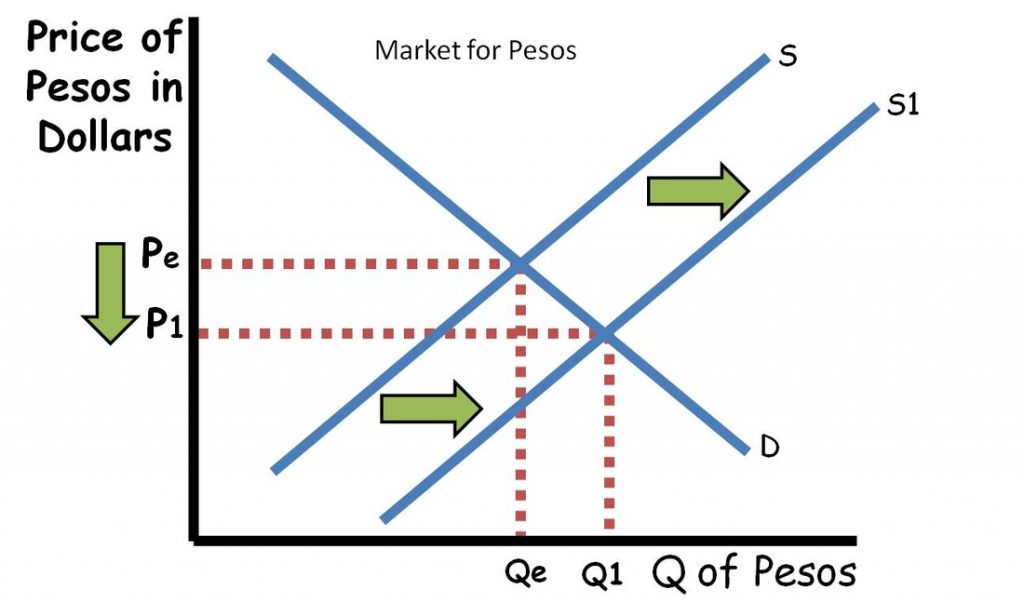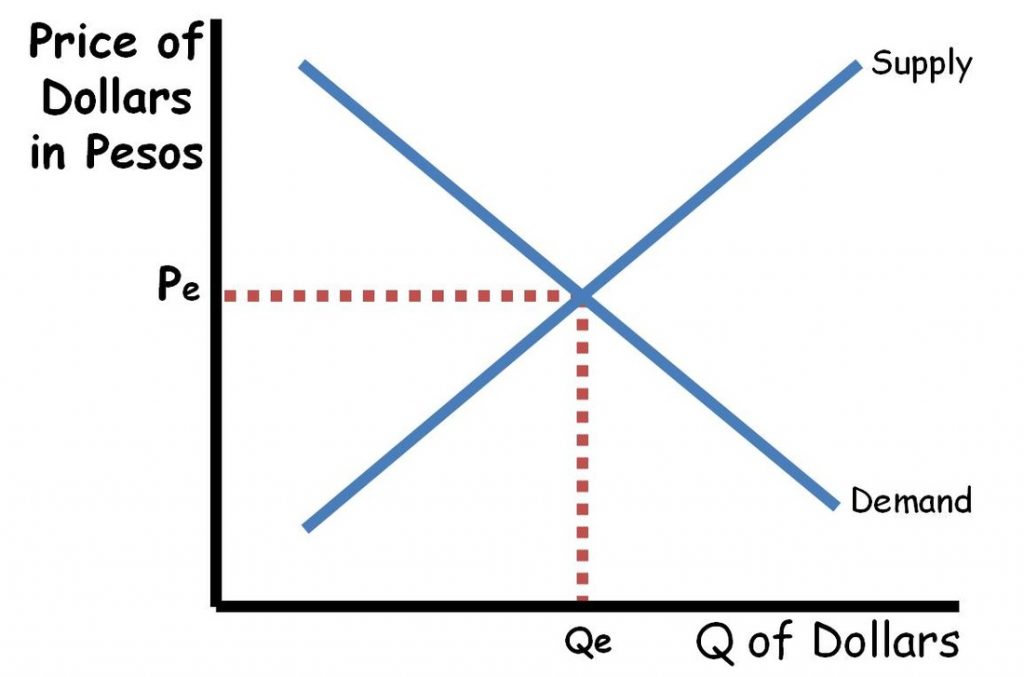What does foreign exchange market mean in economics? This vast and dynamic marketplace plays a crucial role in international trade and finance. It’s where currencies are traded, and its activities impact economies worldwide. Delve into the intricacies of the foreign exchange market, from its participants to the factors shaping currency values.
The foreign exchange market, often abbreviated as Forex, is a decentralized global market for trading currencies. It facilitates the exchange of one currency for another, enabling international trade and investment. The market operates 24 hours a day, five days a week, with participants from various sectors, including banks, corporations, central banks, and individual investors.
Definition of Foreign Exchange Market
The foreign exchange market (forex market) is a global decentralized market where currencies are traded. It is the largest financial market in the world, with an average daily trading volume of over $5 trillion. The forex market is used by businesses, governments, and individuals to exchange currencies for various reasons, including international trade, investment, and speculation.
Types of Foreign Exchange Markets
There are several types of foreign exchange markets, each with its own unique characteristics and functions:
- Spot market: The spot market is the most common type of foreign exchange market. In the spot market, currencies are traded for immediate delivery (typically within two business days).
- Forward market: The forward market is used to trade currencies for future delivery. Forward contracts are agreements to exchange currencies at a predetermined exchange rate on a specified future date.
- Swap market: The swap market is used to exchange currencies and interest rates. Swap contracts are agreements to exchange currencies and interest payments at predetermined intervals.
Participants in the Foreign Exchange Market
The foreign exchange market is a global, decentralized marketplace where currencies are traded. Various entities participate in this market, each with distinct roles and motivations.
The primary participants in the foreign exchange market include banks, central banks, corporations, and individual investors. Each group plays a crucial role in facilitating currency exchange and influencing market dynamics.
Banks
Banks are the largest participants in the foreign exchange market, accounting for the majority of currency trading volume. They act as intermediaries between buyers and sellers of currencies, providing liquidity and facilitating transactions.
Banks participate in the foreign exchange market for several reasons, including:
- Profitability: Banks earn profits from the spread between the buying and selling prices of currencies.
- Customer service: Banks provide foreign exchange services to their corporate and individual clients, such as currency exchange, hedging, and trade finance.
- Risk management: Banks use foreign exchange transactions to manage their own currency risk and the risk of their clients.
Central Banks
Central banks are responsible for managing the monetary policy of their respective countries. They participate in the foreign exchange market to influence the value of their currencies and maintain economic stability.
Central banks intervene in the foreign exchange market through various mechanisms, such as:
- Buying or selling currencies: Central banks can buy or sell their own currency to strengthen or weaken its value.
- Interest rate adjustments: Central banks can raise or lower interest rates to make their currency more or less attractive to foreign investors.
- Capital controls: Central banks may impose restrictions on the flow of capital into or out of their countries to manage currency volatility.
Corporations, What does foreign exchange market mean in economics
Corporations participate in the foreign exchange market to facilitate international trade and manage currency risk.
Corporations engage in foreign exchange transactions for various reasons, including:
- Importing and exporting: Corporations need to exchange currencies to pay for goods and services purchased or sold abroad.
- Hedging: Corporations use foreign exchange contracts to protect themselves against currency fluctuations that could impact their profits.
- Investment: Corporations may invest in foreign markets, which requires the exchange of currencies.
Individual Investors
Individual investors participate in the foreign exchange market primarily for speculative purposes, hoping to profit from currency price movements.
Individual investors typically trade currencies through online platforms or brokers. They use various trading strategies, such as technical analysis and fundamental analysis, to make informed trading decisions.
Factors Affecting Foreign Exchange Rates

The value of currencies in the foreign exchange market is influenced by a complex interplay of economic, political, and psychological factors. Understanding these factors is crucial for traders, investors, and businesses operating in the global economy.
Economic Factors
Economic factors that affect foreign exchange rates include:
- Interest Rates: Higher interest rates in a country make its currency more attractive to foreign investors, leading to an appreciation in its value.
- Inflation: High inflation can erode the value of a currency, making it less desirable in the foreign exchange market.
- Economic Growth: Strong economic growth indicates a healthy economy and a stable currency.
- Trade Balance: A trade surplus, where exports exceed imports, strengthens a country’s currency.
Political Factors
Political factors that can influence foreign exchange rates include:
- Political Stability: Political instability, such as wars or revolutions, can weaken a currency.
- Government Policies: Government policies, such as fiscal and monetary policies, can affect economic growth and inflation, indirectly impacting currency values.
- International Relations: Diplomatic disputes or trade wars can negatively impact foreign exchange rates.
Psychological Factors
Psychological factors can also play a role in foreign exchange rates:
- Market Sentiment: Positive market sentiment can lead to increased demand for a currency, while negative sentiment can cause its value to fall.
- Speculation: Currency traders often speculate on future movements in foreign exchange rates, which can create volatility in the market.
Foreign Exchange Market Regulation
The foreign exchange market is a global and decentralized market, which means it is not subject to the regulations of any single country. However, central banks and other regulatory bodies play an important role in overseeing the market and ensuring its stability.
One of the main roles of central banks is to manage the value of their country’s currency. They do this by buying and selling foreign currencies in the foreign exchange market. By intervening in the market, central banks can help to stabilize the value of their currency and prevent it from becoming too volatile.
Discover the crucial elements that make foreign exchange market pdf free download the top choice.
In addition to central banks, other regulatory bodies also play a role in overseeing the foreign exchange market. These bodies include the International Monetary Fund (IMF) and the Bank for International Settlements (BIS). The IMF is responsible for promoting international monetary cooperation and providing financial assistance to countries that are experiencing economic difficulties. The BIS is a global organization that promotes cooperation among central banks and other financial institutions.
The regulations and measures implemented by central banks and other regulatory bodies are designed to maintain market stability and prevent manipulation. These regulations include:
- Limits on the amount of foreign currency that can be traded
- Requirements for banks to hold a certain amount of foreign currency in reserve
- Restrictions on the use of certain financial instruments
- Prohibitions on insider trading and other forms of market manipulation
These regulations help to ensure that the foreign exchange market is a fair and orderly place to trade.
Role of Central Banks
Central banks play a crucial role in regulating the foreign exchange market. They are responsible for managing the value of their country’s currency and ensuring its stability. Central banks do this by buying and selling foreign currencies in the foreign exchange market.
Central banks also implement regulations to prevent manipulation and maintain market stability. These regulations include limits on the amount of foreign currency that can be traded, requirements for banks to hold a certain amount of foreign currency in reserve, and restrictions on the use of certain financial instruments.
Understand how the union of foreign exchange market holidays can improve efficiency and productivity.
Role of Other Regulatory Bodies
In addition to central banks, other regulatory bodies also play a role in overseeing the foreign exchange market. These bodies include the International Monetary Fund (IMF) and the Bank for International Settlements (BIS).
Check foreign exchange market definition and example to inspect complete evaluations and testimonials from users.
The IMF is responsible for promoting international monetary cooperation and providing financial assistance to countries that are experiencing economic difficulties. The BIS is a global organization that promotes cooperation among central banks and other financial institutions.
These regulatory bodies work together to ensure that the foreign exchange market is a fair and orderly place to trade.
Impact of Foreign Exchange Market on the Economy

The foreign exchange market has a significant impact on the global economy, influencing factors such as inflation, economic growth, and international trade. Exchange rate fluctuations can bring both positive and negative effects, depending on the specific circumstances.
Positive Effects
- Enhanced Trade and Investment: Stable exchange rates facilitate international trade and investment, allowing businesses to operate across borders without significant currency risks.
- Inflation Control: Central banks can use foreign exchange interventions to manage inflation by influencing the value of their currencies.
- Economic Growth: A competitive exchange rate can boost exports and attract foreign investment, contributing to economic growth.
Negative Effects
- Exchange Rate Volatility: Sudden fluctuations in exchange rates can disrupt trade, investment, and economic stability.
- Inflationary Pressures: A sharp depreciation of a currency can lead to imported inflation, raising the prices of goods and services.
- Economic Downturns: A prolonged period of currency depreciation can undermine confidence, reduce investment, and trigger economic downturns.
Example: The appreciation of the US dollar in the early 2000s made US exports more expensive, contributing to a widening trade deficit. Conversely, the depreciation of the Chinese yuan in recent years has made Chinese exports more competitive, boosting its trade surplus.
Summary: What Does Foreign Exchange Market Mean In Economics
:max_bytes(150000):strip_icc()/Exchange-Rate-1b1df02db6a14eee998e1b76d5c9b82d.jpg)
The foreign exchange market is a complex and ever-evolving landscape, influenced by a myriad of economic, political, and psychological factors. Its activities have a profound impact on economies, affecting inflation, economic growth, and international trade. Understanding the dynamics of the foreign exchange market is essential for businesses, investors, and policymakers alike.
